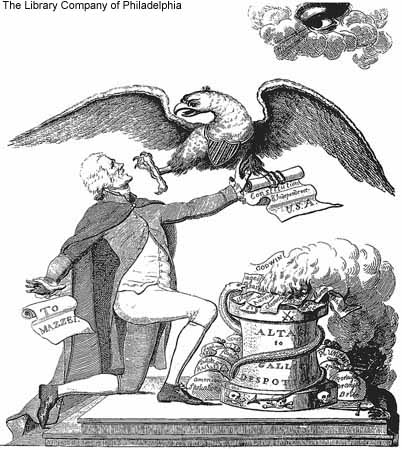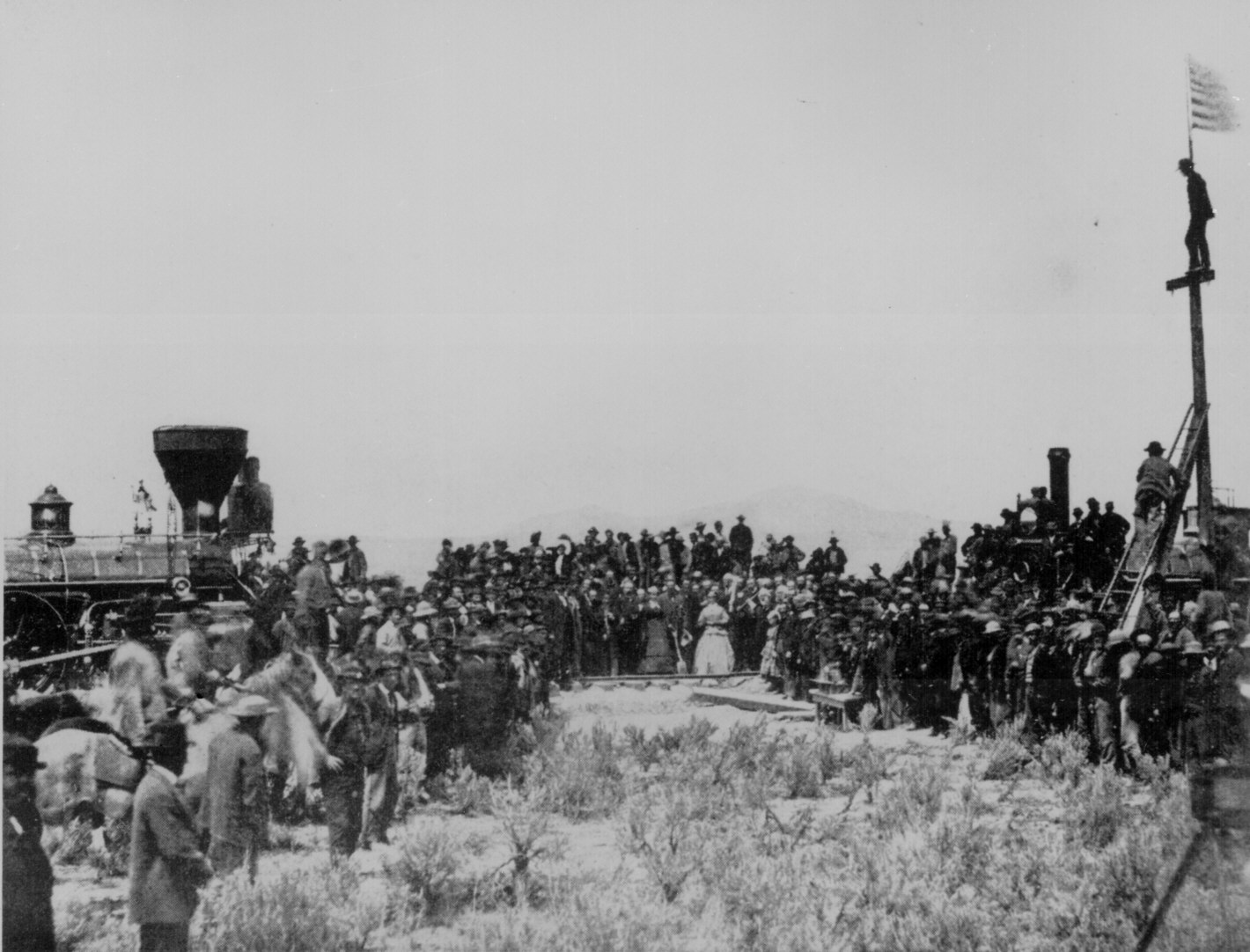|

"The Providential
Detection": An 1800 etching attacking
Presidential candidate Thomas
Jefferson for being an infidel.Courtesy of the Library Company of
Philadelphia.
|
Questions to
consider:
1. What were the causes of tension between "Federalists" and
"Democratic-Republicans" in the 1790s?
2. How did a nation
with a rhetorical commitment to equality accommodate the existence
of slavery?
3. Why was Thomas Jefferson's election hailed by his supporters as
the "Revolution
of 1800"?
4. How did the presence
of slavery and the issue of race influence the creation of American
national identity in the early national period?
6. What role did parties play in politics in this period?
7. What role did sectional identities play in politics in this period?
8. Can the United States be considered a "nation" by 1815?
Primary Sources
The
Constitution of the United States of America [at the National Archives
web site]
George
Washington reflects on the emergence of partisanship, 1799
Debates
in the Constitutional Convention about the slave trade
Extract
from The Federalist Papers (Alexander Hamilton)
Exchange of letters between
Benjamin Banneker and Thomas Jefferson, 1791
Daniel
Webster, "Plymouth Oration", December 22, 1820
Thomas
Jefferson, Letter to John Holmes, 1820
Introductory
reading
Ronald P. Formisano, ‘Deferential-Participant
Politics: The Early Republic’s Political Culture, 1789-1840’,
American Political Science Review 68 (1974).
William
W. Freehling, "The Founding Fathers and Slavery", American
Historical Review 77:
1 (1972): 81-93.
Gordon S. Wood, "The
Significance of the Early Republic", Journal of the Early Republic 8 (1988): 1-20
John
Murrin, "Gordon
S. Wood and the Search for Liberal America", William
and Mary Quarterly, 44: 3, (Jul., 1987): 597-601
Further reading
C. Edward Skeen, ‘“Vox
Populi, Vox Dei”: The
Compensation Act of 1816 and the Rise of Popular Politics’, Journal
of the Early Republic 6 (1986): 253-274
Ratcliffe,
Donald J., Party Spirit in a Frontier Republic: Democratic Politics
in Ohio 1793-1821 (Ohio: State University Press, 1998)
Gordon Wood, Creation of the American Republic, 1776-1787 (1969)
chapters 12-13.
Edmund Morgan, The Birth of the Republic 1763-1789 (1977), chapters
9-11.
Francis Cogliano, Revolutionary America, 1763-1815: A Political History (2000),
chapters 5-10
Isaac Kramnick, 'Introduction' to the Penguin edition of The Federalist
Papers (1987)
John P. Kaminski and Richard Leffler, eds., A Necessary Evil? Slavery
and the Debate over the Constitution.(1992)
Jackson T. Main, The Antifederalists: Critics of the Constitution,
1781-1788 (1961)
Gordon S. Wood, The Radicalism of the American Revolution (1991)
Merrill Jensen, The New Nation: a History of the United States during
the Confederation, 1781-1789 (1950)
Richard P. McCormick, The Presidential Game, 1982
Richard B. Morris, The Forging of the Union, 1781-1789 (1987)
Duncan J. MacLeod, Slavery, Race and the American Revolution (1974)
Richard Hoftsadter, The Idea of a Party System, pp. 122-211.
Drew McCoy, The
Elusive Republic, chs 1-8
David Waldstreicher, In the Midst of Perpetual Fetes: The Making
of AMerican Nationalism, 1776-1820 (1997)
Simon P. Newman, Parades and Politics of the Street: Festive Culture in
the Early American Republic (1997)
Saul Cornell, The Other Founders: Anti-Federalism and the Dissenting Tradition
in America, 1788-1828 (1999)
Freeman, Joanne B., ‘The Culture of Politics: The Politics of Culture’,
Journal of Policy History 16 (2004), 137-143
Robert Pierce Forbes, Missouri Compromise and its aftermath: slavery and
the meaning of America (2007)
Robert P. Hay, ‘The American Revolution Twice Recalled: Lafayette’s
Visit and the Election of 1824,’ Indiana Magazine of History 69 (1973)
Alan Taylor, William Cooper’s Town: Power and Persuasion on the Frontier
of the Early American Republic (1996)
|
